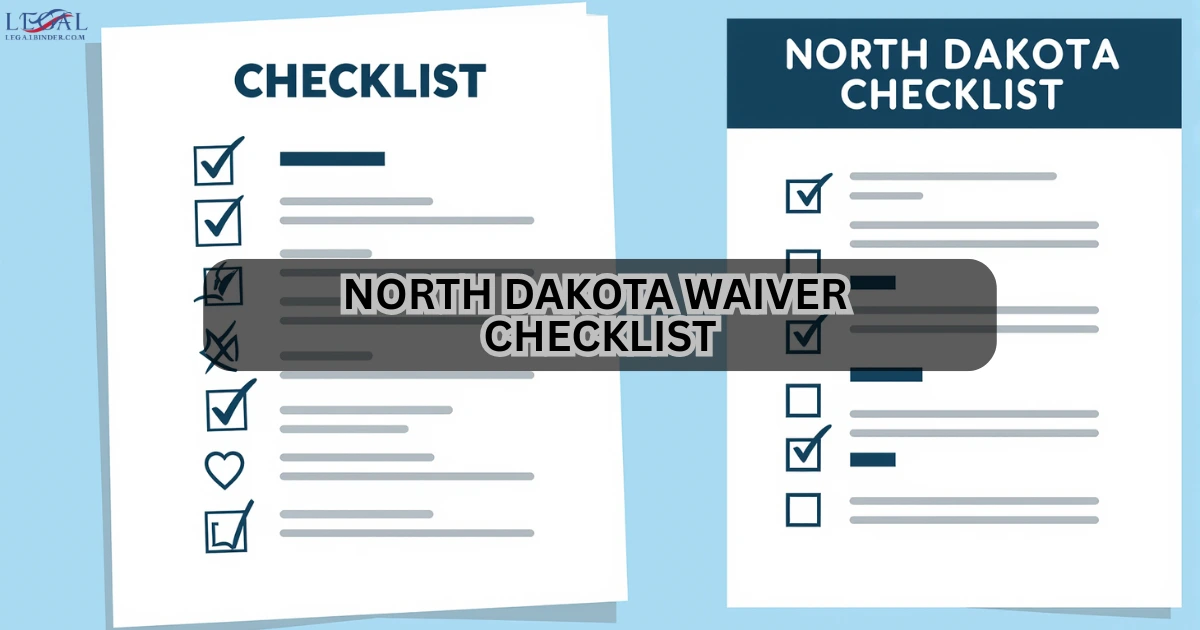This waiver North Dakota checklist guide provides a complete overview for residents seeking fee waivers for court filings in 2025. It outlines eligibility, required forms, step-by-step instructions, and official state resources to ensure proper submission.
For additional guidance, visit USALegalBinder.com for related legal resources.
Quick Overview — What This Waiver North Dakota Covers
In North Dakota, court fee waivers, also called In Forma Pauperis (IFP) requests, allow residents to file legal documents without paying court fees due to financial hardship. Common applications include:
- Civil cases in district or county courts.
- Family law matters, such as divorce, child support, or custody petitions.
- Appeals and probate filings.
The waiver allows applicants to proceed without the burden of upfront court costs if eligibility is approved.
State-Specific Requirements Waiver North Dakota
Eligibility in North Dakota requires the following:
- Residency in North Dakota or subject to a North Dakota court’s jurisdiction.
- Proof of inability to pay filing fees, demonstrated through income, assets, and monthly expenses.
- Submission of all supporting documentation with the waiver application.
Key agencies and resources include:
Step-by-Step How to Complete & Submit Waiver North Dakota
- Obtain the correct waiver form: Download the North Dakota In Forma Pauperis form from official court resources.
- Complete personal and financial information: Include income, household size, monthly obligations, and outstanding debts.
- Attach supporting documents: Provide pay stubs, public assistance letters, bank statements, and housing expense records.
- Sign and notarize: Verify if your local court requires notarization of the affidavit.
- File with the court clerk: Submit in-person or via the North Dakota e-filing system if applicable.
- Keep a stamped copy: Retain for records and to track case updates.
- Respond to any court requests: Provide additional information promptly if the court requests clarification.
- North Dakota In Forma Pauperis affidavit or fee-waiver motion form.
- Proof of income or benefits (DHS, unemployment, SSI, SNAP).
- Recent bank statements (1–3 months).
- Proof of rent, mortgage, utilities, or other monthly obligations.
- Any other documentation requested by the court to verify financial hardship.
Processing Time, Fees, and Deadlines Waiver North Dakota
- Processing time: Most waiver requests are reviewed within 5–10 business days.
- Fees: Submission of a waiver application is free of charge.
- Deadlines: Submit well before court filing deadlines to avoid delays.
- Expedited requests: Emergency family law or protective order waivers may be prioritized.
Common Mistakes to Avoid Waiver North Dakota
- Submitting incomplete or unsigned forms.
- Omitting supporting financial documentation.
- Using outdated or unofficial forms.
- Delaying submission and missing court deadlines.
FAQs
Q: Do public benefits automatically qualify me for a waiver?
A: No. While benefits support eligibility, courts review the full financial situation.
Q: Can inmates file for a waiver?
A: Yes, using prison trust account statements and following court procedures.
Q: What if my waiver request is denied?
A: You must pay filing fees. You may also request reconsideration or seek legal aid assistance.
Q: Are family court waivers handled differently?
A: Some family filings may be expedited. Check local court rules.
Q: Where can I get help preparing my waiver?
A: Legal aid offices, law school clinics, or court self-help centers can assist, but clerks cannot provide legal advice.
Conclusion & Call to Action
Following this waiver North Dakota checklist ensures your application is complete and compliant. File early, maintain copies, and track your case status.
Visit the North Dakota Courts forms page and Department of Human Services for official guidance. For case-specific advice, consult a North Dakota attorney or legal aid provider. Additional resources are available at USALegalBinder.com.
